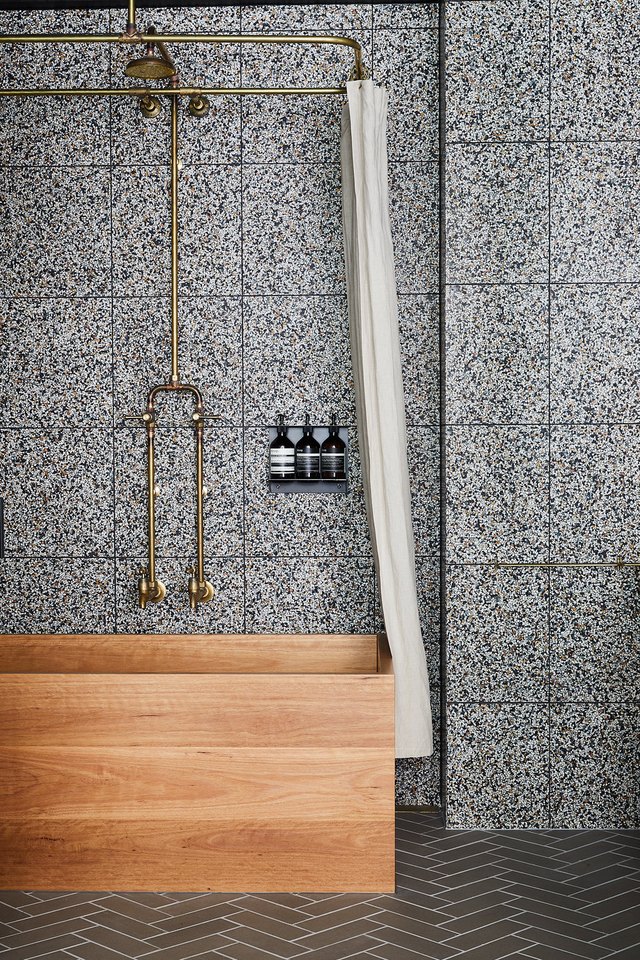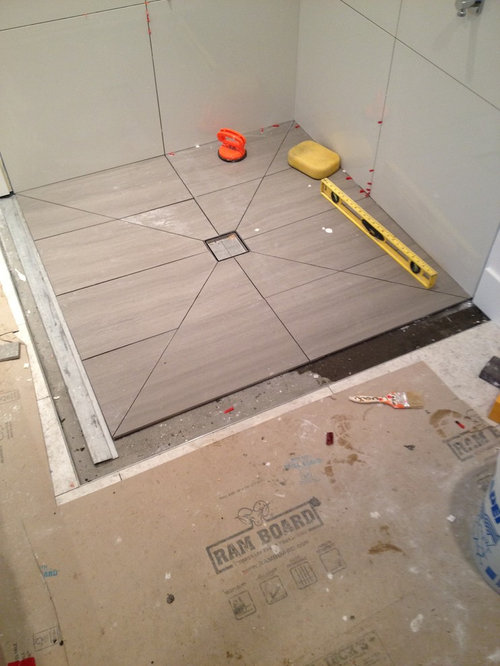Stepping out of a hot shower onto a slick, glossy tile floor can feel like a scene from a comedy movie. You know the one – the slip, the scramble, the frustrated yell. It’s a hilarious image, but the reality of trying to navigate a slippery shower floor isn’t funny at all. This experience made me question the practicality of using glossy tile in showers, especially on the floor. Was it simply a stylistic choice or was there a more practical consideration?

Image: www.hunker.com
The question – “Can you use glossy tile on a shower floor?” – doesn’t have a simple yes or no answer. It’s about weighing the pros and cons, understanding the risks, and ultimately making an informed decision based on your individual needs and preferences.
The Allure of Glossy Tiles: A Look at the Aesthetics
Glossy tiles are often chosen for their sleek and modern appearance. They reflect light, creating a sense of spaciousness and brightness, especially in smaller bathrooms. The high shine also adds a touch of elegance and sophistication to the space. However, this aesthetic appeal comes with a price, literally and figuratively.
Glossy tiles can be more expensive than matte tiles, and the extra care required to maintain their shine can add to the cost. You’ll need to invest in specialized cleaning products and put in extra effort to avoid scratches and watermarks that are more visible on glossy surfaces.
Understanding the Risks of Glossy Shower Floor Tiles
The primary concern with glossy tiles in showers, especially on the floor, is the risk of slipping. The smooth, polished surface offers little traction, particularly when wet. This can be a serious safety hazard, especially for children, the elderly, and anyone with mobility issues. Even for able-bodied individuals, a slippery shower floor can lead to unexpected falls and injuries.
Choosing the Right Tiles Based on Their Coefficient of Friction (COF)
The slipperiness of a tile is determined by its coefficient of friction (COF). The higher the COF, the more grip the tile provides. It is essential to choose tiles with a COF of 0.42 or higher for shower floors. This ensures adequate traction and minimizes the risk of slipping.
While glossy tiles can have a high COF, it’s important to test them yourself before committing. Ask for tile samples and try them out in your shower. If the tiles feel slippery, even when dry, look for alternative materials or consider a different finish.

Image: phenergandm.com
Alternative Flooring Options for Your Shower
If you’re concerned about the potential for slipping, there are several alternative flooring options that provide excellent grip and are equally stylish.
Matte tiles: Matte tiles have a more textured surface, providing greater traction and making them safer for shower floors. They come in a wide range of colors and designs, so you can still achieve the look you desire without compromising safety.
Textured tiles: These tiles come in various designs, from simple linear patterns to intricate mosaics. The textured surface offers excellent grip, making them an excellent choice for shower floors.
Stone tiles: Natural stone tiles like slate, travertine, and granite provide a beautiful and durable option for shower floors. Their natural texture also enhances traction, creating a safe and stylish space.
Tips for Enhancing Safety in Shower Floors
Even if you opt for a safer tile option, there are still measures you can take to make your shower floor as safe as possible.
Install anti-slip strips or mats: These inexpensive additions can drastically improve traction, especially in areas prone to water accumulation. Choose strips or mats designed specifically for shower floors and ensure that they are securely fastened to the surface.
Use non-slip shower shoes: These are especially important for individuals at higher risk of falls. Choose shower shoes that provide adequate support and grip, and avoid slipping on wet surfaces.
Maintain a clean shower floor: Regular cleaning helps to prevent the build-up of soap scum and other residues that can make the floor slippery.
Expert Advice on Making an Informed Decision
When choosing your shower floor tiles, consult with a professional contractor or tile expert who can guide you based on your specific needs and preferences. They can assess the area, advise on suitable materials and finishes, and ensure proper installation for maximum safety and durability.
Ultimately, the decision of whether or not to use glossy tiles on your shower floor is yours. Weigh the pros and cons carefully. Consider your lifestyle, your family’s needs, and your risk tolerance. Remember, safety should always be a priority, and there are many beautiful and functional alternatives available that can create a safe and stylish shower space for you.
FAQ:
Q: Can I apply a non-slip coating to glossy tiles?
A: While non-slip coatings can provide some additional traction, they might not be completely effective on glossy tiles. The smoothness of the tile can still contribute to slipperiness, even with the coating. Consider using anti-slip strips or mats for extra safety.
Q: Are there any specific brands or types of glossy tiles that are safer than others?
A: Some manufacturers offer glossy tiles with a higher COF, but it’s essential to check the specifications before making a decision. It’s also important to test the tiles yourself to determine their grip.
Q: How do I clean glossy tiles to keep them shiny?
A: Use a mild cleaning agent and a soft cloth to avoid scratches. Avoid abrasive cleaners and harsh chemicals that can damage the surface.
Can You Use Glossy Tile On Shower Floor
Conclusion:
The decision of whether or not to use glossy tile on your shower floor comes down to personal preference, budget, and safety concerns. While glossy tiles are aesthetically appealing, they pose a potential slip hazard. Choosing an alternative flooring option like matte, textured, or stone tiles, or incorporating safety measures like anti-slip strips, will make your shower a safer and more enjoyable space.
Are you considering using glossy tiles in your shower? We’d love to hear your thoughts and experiences! Let us know in the comments section below.



/GettyImages-173599369-58ad68f83df78c345b829dfc.jpg?w=740&resize=740,414&ssl=1)


